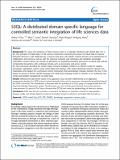| dc.contributor.author | Deus, Helena | |
| dc.date.accessioned | 2012-05-03T11:02:31Z | |
| dc.date.available | 2012-05-03T11:02:31Z | |
| dc.date.issued | 2011 | |
| dc.identifier.citation | Deus, H.,Correa, M. C., Stanislaus, R.,Miragaia, M., Maass, W. and de Lencastre, H. and Fox, R. and Almeida, J.S. (2011) 'S3QL: A distributed domain specific language for controlled semantic integration of life sciences data'. BMC Bioinformatics, 12 (285). | en_US |
| dc.identifier.uri | http://hdl.handle.net/10379/2710 | |
| dc.description.abstract | Background
The value and usefulness of data increases when it is explicitly interlinked with related data. This is the core principle of Linked Data. For life sciences researchers, harnessing the power of Linked Data to improve biological discovery is still challenged by a need to keep pace with rapidly evolving domains and requirements for collaboration and control as well as with the reference semantic web ontologies and standards. Knowledge organization systems (KOSs) can provide an abstraction for publishing biological discoveries as Linked Data without complicating transactions with contextual minutia such as provenance and access control.
We have previously described the Simple Sloppy Semantic Database (S3DB) as an efficient model for creating knowledge organization systems using Linked Data best practices with explicit distinction between domain and instantiation and support for a permission control mechanism that automatically migrates between the two. In this report we present a domain specific language, the S3DB query language (S3QL), to operate on its underlying core model and facilitate management of Linked Data.
Results
Reflecting the data driven nature of our approach, S3QL has been implemented as an application programming interface for S3DB systems hosting biomedical data, and its syntax was subsequently generalized beyond the S3DB core model. This achievement is illustrated with the assembly of an S3QL query to manage entities from the Simple Knowledge Organization System. The illustrative use cases include gastrointestinal clinical trials, genomic characterization of cancer by The Cancer Genome Atlas (TCGA) and molecular epidemiology of infectious diseases.
Conclusions
S3QL was found to provide a convenient mechanism to represent context for interoperation between public and private datasets hosted at biomedical research institutions and linked data formalisms. | en_US |
| dc.description.sponsorship | FP7, SFI | en_US |
| dc.format | application/pdf | en_US |
| dc.language.iso | en | en_US |
| dc.relation.ispartof | BMC Bioinformatics | en |
| dc.rights | Attribution-NonCommercial-NoDerivs 3.0 Ireland | |
| dc.rights.uri | https://creativecommons.org/licenses/by-nc-nd/3.0/ie/ | |
| dc.subject | S3DB | en_US |
| dc.subject | Linked Data | en_US |
| dc.subject | KOS | en_US |
| dc.subject | RDF | en_US |
| dc.subject | SPARQL | en_US |
| dc.subject | Knowledge organization system | en_US |
| dc.title | S3QL: A distributed domain specific language for controlled semantic integration of life sciences data | en_US |
| dc.type | Article | en_US |
| dc.date.updated | 2012-05-02T10:42:50Z | |
| dc.local.publishedsource | http://www.biomedcentral.com/1471-2105/12/285 | en_US |
| dc.description.peer-reviewed | peer-reviewed | |
| dc.contributor.funder | |~| | |
| dc.internal.rssid | 1468918 | |
| dc.local.contact | Helena Deus, Deri, Nui Galway. Email: helena.deus@deri.org | |
| dc.local.copyrightchecked | Yes | |
| dc.local.version | ACCEPTED | |
| nui.item.downloads | 3452 | |


